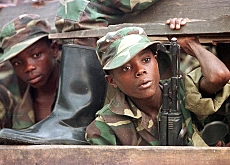
UN queries Swiss war crimes legislation

Swiss officials faced a grilling at the United Nations on Monday amid concerns that Switzerland is not doing enough to prosecute recruiters of child soldiers.
The Geneva-based UN Committee on the Rights of the Child is concerned that a change in Swiss legislation restricts the application of international law on war criminals.
An amendment to the Military Penal Code, which came into force in June 2004, states that suspected war criminals must have a “close link” to Switzerland in order to face prosecution.
This would apply to suspects owning a property or with family in Switzerland, for example, but not those holding a Swiss bank account or holidaying in the country.
The UN committee wrote to the government in November last year seeking an explanation.
It questioned “whether this amendment restricts the exercise of universal jurisdiction over war crimes, such as conscripting or enlisting children under the age of 15”.
Speaking after Monday’s hearing, Hatem Kotrane, Tunisia’s representative on the committee, said he feared lawyers could use the amendment to help war criminals escape justice.
“The [Swiss] authorities are putting up a smokescreen by stating that only war criminals with a close link to Switzerland can be prosecuted,” he said.
Clarification
The “close link” clause has never been clearly defined because it has yet to be tested in a Swiss court. But legal experts in Switzerland believe it should simply be scrapped.
“My personal opinion is that it is a complete nonsense from the point of view of international law, and it’s probably contrary to the Geneva Conventions,” Helen Keller, professor of international law at Zurich University, told swissinfo.
Stefan Trechsel, Swiss emeritus professor and newly elected judge to the International Criminal Tribunal for former Yugoslavia, took the same view in a recent article in the Neue Zürcher Zeitung newspaper.
Under the optional protocol to the Convention on the Rights of the Child, signed by Switzerland in September 2000, countries are bound to prevent the recruitment and use of child soldiers. Where necessary they should adopt legal measures to prohibit and criminalise these practices.
In their initial report to the committee on compliance with the protocol, submitted in July 2004, the Swiss authorities stressed that there were numerous provisions within the criminal law system to prevent the recruitment of child soldiers.
“All Swiss legislation now complies with the obligations contained in the protocol,” said the report, adding that recruitment of child soldiers was non-existent in Switzerland.
“Flood of cases”
Michael Cottier, a legal expert at the Swiss foreign ministry, explained on Monday that parliament had introduced the amendment “to prevent Switzerland being flooded by cases”.
Carine Carey, spokeswoman for the Swiss foreign ministry, told swissinfo ahead of the hearing that the defence ministry had made it clear at the time that the amendment would not undermine international law governing war crimes.
She said the defence ministry had also explained that the amendment merely defined existing procedure in Switzerland and did not constitute a change in practice.
“It is certainly not the intention of Switzerland to avoid its obligations in the framework of international law by introducing the ‘close link’ clause,” said Carey.
The UN committee is expected to give its response on January 27.
swissinfo, Adam Beaumont with agencies
The UN General Assembly adopted the optional protocol to the Convention on the Rights of the Child, aimed at improving protection of children in armed conflict, in May 2000.
Under the protocol, states are required to raise the minimum age for direct participation in hostilities from 15 to 18.
Switzerland signed the protocol at the Millennium Summit in New York in September 2000. It entered into force in July 2002.

In compliance with the JTI standards
More: SWI swissinfo.ch certified by the Journalism Trust Initiative




























You can find an overview of ongoing debates with our journalists here . Please join us!
If you want to start a conversation about a topic raised in this article or want to report factual errors, email us at english@swissinfo.ch.